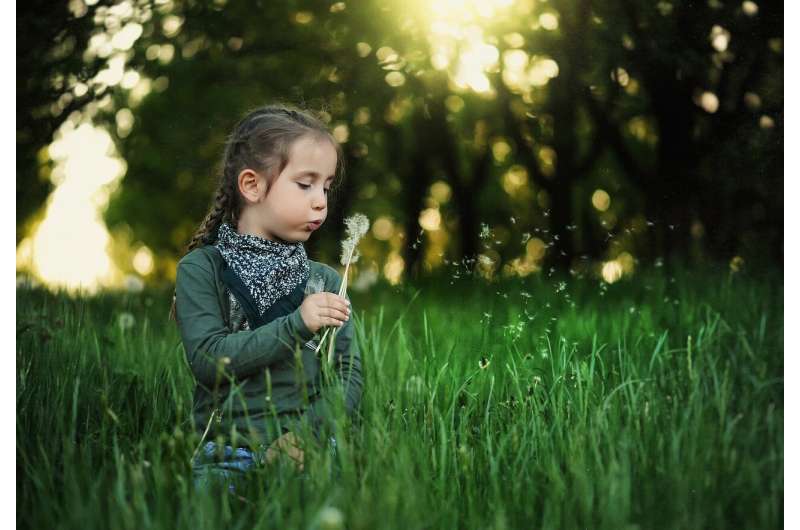Children don't like nature as much as adults—but preferences change with age

A study of kids aged 4-11 suggests affinity for outdoors may not be inherent. Imagine staring at a lake backed by snow-capped mountains, walking through a secluded forest or listening to birds sing. Now imagine a busy downtown, with skyscrapers soaring up above the rush of trains and cars.
Odds are you prefer the natural scenes—following a trend among adults confirmed by numerous studies. Less clear is whether this preference is inherent, or if it is learned through experience.
To help answer that question, a team of University of Chicago psychologists surveyed 239 children aged 4 to 11, asking them to rank pictures of urban and natural environments.
In a new study, researchers found that those children preferred urban environments much more than the 167 adult participants. However, preferences for urban environments were significantly lower among older children—suggesting that an affinity for nature may develop gradually in life, rather than being inherent at a young age.
"We hypothesized that the kids would prefer nature because adults overwhelmingly do," said UChicago doctoral student Kim Lewis Meidenbauer, lead author of the study, published in the Journal of Environmental Psychology. "We were incredibly surprised to find evidence to the contrary."
Meidenbauer conducts research as part of UChicago's Environmental Neuroscience Lab, which explores how physical environments affect the brain and behavior.
Recruiting participants at a local museum, she and her co-authors interviewed more than 90 children from Chicago and other parts of Illinois, more than 100 from other states and 11 from other English-speaking countries. They sought to have at least 20 children of each age group, and also analyzed a subset of their sample that excluded siblings.
The scholars used images that were equated in visual appeal, so as to account for aesthetic preferences unrelated to natural or urban environments. They also found that children's preferences were not related to the amount of time they spent outdoors in natural environments.
This research help fills a gap in the existing body of research on nature preferences, which has not closely examined children under 9 years old.
"It is important to note that our results do not mean that nature is not good for children," said Marc Berman, the study's senior author and an associate professor in the Department of Psychology. "Plenty of studies on nature interactions, including many from our laboratory, show that cognitive, social and health benefits in adults are not driven by preferences or improvements in mood. So, it doesn't seem like the cognitive benefits of nature exposure are all about liking nature or some kind of hedonic response.
"This work also suggests that fondness for nature is not a given in childhood. Therefore, exposing children to natural experiences early in life may be critical for them to develop an appreciation for nature later in life."
As director of the Environmental Neuroscience Lab, Berman is a leading expert on the relationship between environmental factors and individual neural processing. His previous research has helped shape scholarly understanding of how nature can impact cognitive performance—even when experienced through videos and sounds.
In addition to Meidenbauer and Berman, other co-authors on the study were former UChicago postdoctoral fellow Cecilia Stenfors, now at Stockholm University; Environmental Neuroscience Lab research technician Jaime Young, AM'17; Elliott Layden, Ph.D."19; UChicago doctoral student Kathryn Schertz and postdoctoral fellow Omid Kardan, Ph.D."19; and Jean Decety, the Irving B. Harris Distinguished Service Professor in Psychology and Psychiatry.
The scholars have not yet identified an obvious cause for why children's preferences counter those of adults. One theory is that the children are influenced by their parents, and that those influences may take time to manifest. That idea is bolstered by the researchers' data, which show that older children's preferences increasingly mirrored those of their parents.
The psychologists hope to continue investigating whether there are other mechanisms at play, and if adults and children weigh environmental preferences to different degrees. They also hope to conduct similar research on the preferences of adolescents.
"Our study also found evidence for the cognitive benefits of nature exposure in kids, and it was entirely unrelated to preference," Meidenbauer said. "This is important because it really suggests that kids don't need to like nature for it to be good for them."
More information: Kimberly L. Meidenbauer et al. The gradual development of the preference for natural environments, Journal of Environmental Psychology (2019). DOI: 10.1016/j.jenvp.2019.101328

















